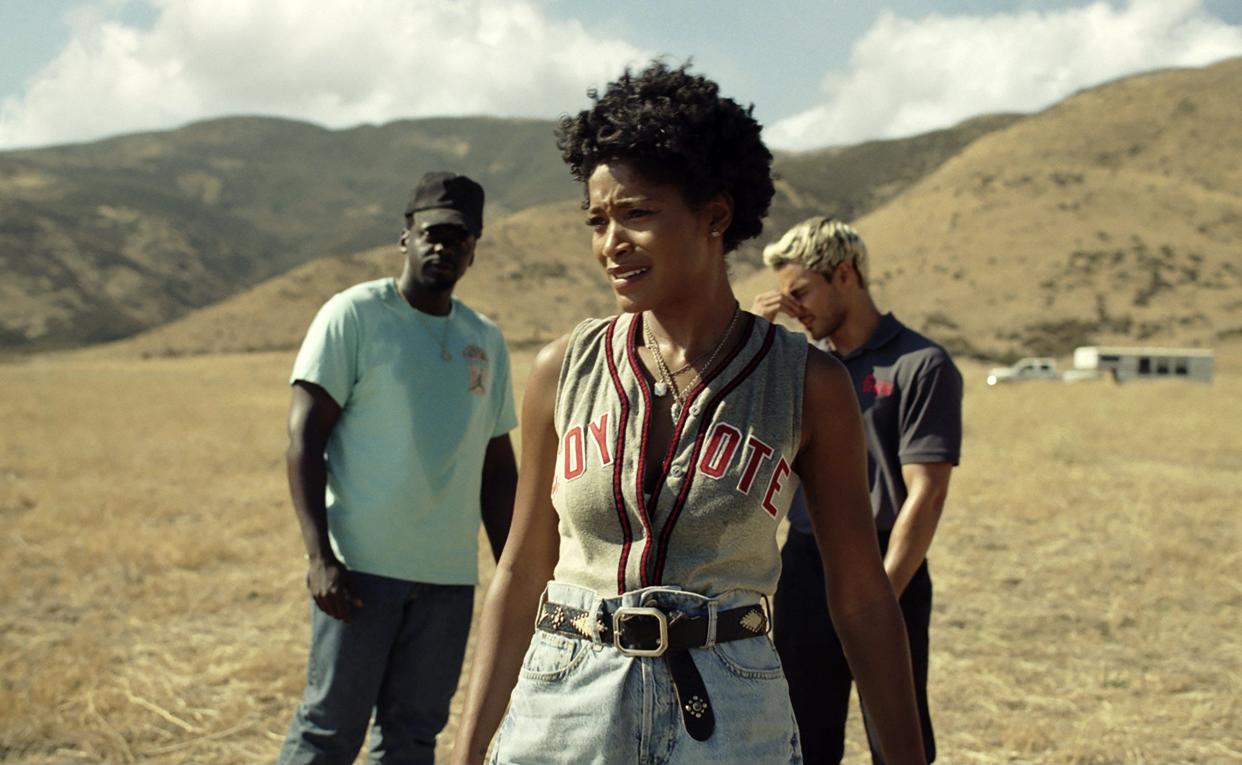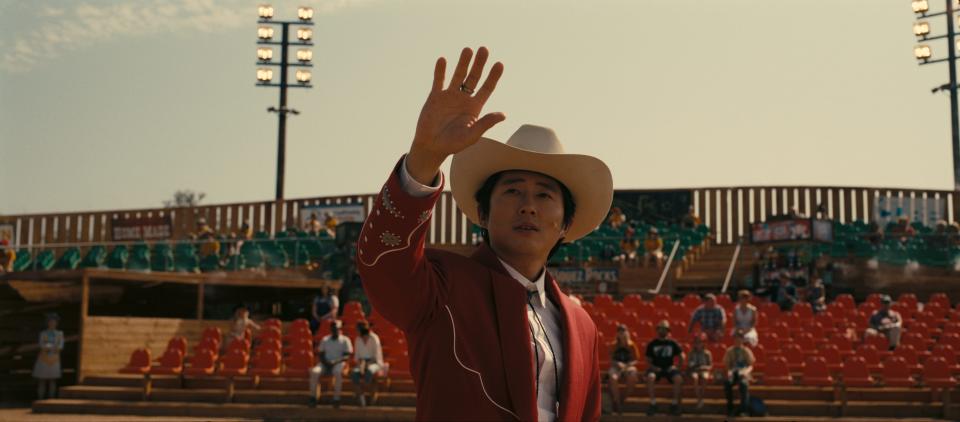Jordan Peele focuses the energy of 'Nope' on movies and their makers

- Oops!Something went wrong.Please try again later.
- Oops!Something went wrong.Please try again later.
Many reviewers and commentators have spilled secrets about “Nope” in the past week since its release, but it’s better to go in with as few details as possible. I think you should see it despite some issues with the film and, thus, I’ve avoided spoilers as best I can.
Filmmaker Jordan Peele uses the sci-fi/horror hybrid to tell a tale of humanity confronting an otherworldly force. Each distinctive character come from a place of tragedy when we first meet them.
The film examines how each individual tragedy influences how someone would encounter such an unbelievable situation; and the audience reflects on how they might act if faced with some wonder. Would we be cautious and aware or let the moment lead us into something rash?
Few supernatural films contemplate how a “real” person would act. Usually we see scientists and military types with fancy gadgets and lots of brawn. Peele has lots of thoughts on this: some stand very well on their own; many do not mesh with the others. Some are so much more affecting than others that they throw off the film's balance.
But Peele also has thoughts on filmmaking itself and the power it has to change hearts and minds. He doesn’t stop there, pondering his own place in film history; brazen for even a great filmmaker who has just three directorial efforts under his belt.
Peele certainly deserves some of his indulgent hubris, but it could be left out of a film already stuffed to the brim with artistic flourishes.
More: How 'Tahara' director Olivia Peace might represent the future of filmmaking
OJ and Emerald Haywood (Daniel Kaluuya and Keke Palmer, respectively) own the Haywood Hollywood Horses ranch, leasing equines to movie productions. They purport to be the descendants of the unnamed rider in the ground-breaking 1870s visual “The Horse in Motion.” Some say it is the first ever set of moving pictures. The Black rider in the images is regrettably forgotten by history. That plays into Peele’s motives later on.
Things are rough on the inland California ranch after the Haywood patriarch (Keith David) dies in a freak accident. Emerald may have a way with people and OJ may have a way with horses, but their personalities fail to gel and business suffers.
Something big needs to happen. About this time, something big shows up in the sky. What it is I'll leave for you to discover. The Haywood’s aren’t sure, either, but believe it must be captured. On film, that is, in order to make themselves rich, relevant or both.
Meanwhile across the gulch, there’s a tourist trap run by former child star Ricky “Jupe” Park (Steven Yeun), whose career and psyche never quite escaped the horrific notoriety of an on-set tragedy from a '90s sitcom called “Gordy’s Home.” As details unspool, the viewer becomes more unsettled and terrified by what happened. I got goosebumps. The hair stood up on the back of my neck.

Jupe handles this childhood horror in the worst way possible — glorifying and monetizing it. He too has seen the unusual apparition in the sky, and has different ideas about how it can help him back into the limelight.
I kept waiting for the “Gordy’s Home” subplot to influence “Nope” the same way Peele saved his fixation on Hands Across America for the finale of 2019’s “Us.” But it never happens. Rather, the film focuses on the siblings and their photographic preservation. The audience is treated to a lot of conversations about video equipment. Heck, the name of the camera guy employed by the Haywoods is Angel. Celestial guidance, indeed.
When these modern devices fail — this entity has ways of evading detection — they turn to a crusty cinematographer (Michael Wincott) who brings a hand-cranked IMAX camera to the ranch.
The goal of the characters is to preserve what they see on film. In turn, that means the camera operators — and, by extension, filmmakers — are the real heroes of “Nope.” Peele is not the first to engage in such egomania. He’s not even the first to do it with an alien invasion movie: Spielberg focuses significant attention on cameramen in his 2005 “War of the Worlds.”
But there’s more to this. OJ is filmed deliberately in key moments to evokes “A Horse in Motion.” Kaluuya and his horse stoically gallop behind a fence row, all but replicating that first bit of celluloid. Subliminally, Peele places “Nope” as the next evolutionary leap of movie making. “Nope” is the alpha and omega when it comes to film, Peele declares. I am as big a fan of “Get Out” and “Us” as anyone, but this seems to be a premature victory lap.
More: True/False names 'Million Dollar Pigeons' this year's Boone Dawdle film
Then again, Peele is one of the few filmmakers allowed to make original movies these days and he does so with actors of color in every lead role. If anyone is entitled to indulge, perhaps it is him.
Filmmakers are cocky and bigheaded, qualities they're afforded when they can put up the goods. By focusing on his camera-wielding cowboys to make a larger point about his place in Hollywood, Peele abandons some of the darkest, most interesting storytelling.
Ricky Park and “Gordy’s Home” might be too weird, too unsettling, for most audiences and perhaps that’s why Peele buries it in a larger story. But that segment haunts the rest of the film and overtakes its self-aggrandizing navel-gazing.
By all means, do not take this as a reason to skip "Nope." Few original Hollywood productions have the breadth of ideas presented here. It's fun to discuss and debate. We need studios to take risks like this even if they don’t land perfectly.
In real life, James Owen is a lawyer and executive director of energy policy group Renew Missouri. He created/wrote for Filmsnobs.com from 2001-2007 before an extended stint as an on-air film critic for KY3, the NBC affiliate in Springfield. He was named a Top 20 Artist under the Age of 30 by The Kansas City Star when he was much younger than he is now.
This article originally appeared on Columbia Daily Tribune: Jordan Peele focuses the energy of 'Nope' on movies and their makers

